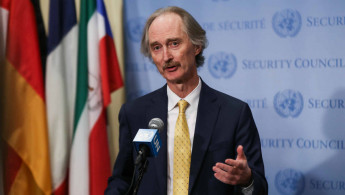UN envoy says a 'new Syria' starts with reconciliation
The United Nations envoy for Syria on Tuesday said a solution to the eight-year-long conflict begins with confidence building measures and reconciliation between warring parties.
"Path to a new Syria begins with confidence-building and reconciliation," Norwegian diplomat Geir Pedersen said on Twitter.
"Syrians need to come together to decide and build (a) future," he said.
His comments came after he visited the central Syrian city of Homs during his second official trip to the war-torn country since he assumed his post in January.
Pedersen met the governor of Homs, the UN team in the area as well displaced Syrians living in camps, he said.
"Scale of challenges facing #Syria and Syrians (is) immense," he tweeted.
The envoy also toured the former rebel stronghold of Baba Amr, which was recaptured by government forces in 2012 after almost a month of heavy shelling.
There has been little reconstruction in the district since the Syrian army seized the area.
"Level of destruction in Baba Amr is vast," Pedersen said.
"Displaced Syrians have suffered enormously and still suffer. But their strength (is) also inspirational."
Pedersen landed in Damascus on Sunday, before meeting with Foreign Minister Walid Muallem.
The envoy said he held "constructive discussions" with Muallem on implementing UN resolution 2254, which calls for a nationwide ceasefire and a political transition.
"Work progressing well, looking forward to furthering the discussions," Pedersen said on Monday.
Pedersen became the fourth UN negotiator aiming to resolve the nearly eight-year conflict, following the resignation of his predecessor Staffan de Mistura.
Since the start of January, he has travelled extensively to meet with the government, opposition and others.
Syria's war has killed more than 370,000 people and displaced millions since the conflict began with the repression of anti-government protests in 2011.
The regime has made a military comeback with Russian military support since 2015, and now holds almost two-thirds of Syria.
Follow us on Twitter: @The_NewArab





 Follow the Middle East's top stories in English at The New Arab on Google News
Follow the Middle East's top stories in English at The New Arab on Google News
![Israeli forces ordered bombed Gaza's Jabalia, ordering residents to leave [Getty]](/sites/default/files/styles/image_330x185/public/2176418030.jpeg?h=a5f2f23a&itok=_YGZaP1z)

